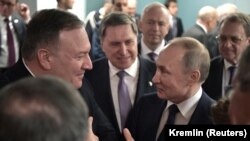Russian President Vladimir Putin, who is taking special measures to protect himself from being infected with the coronavirus, spoke via video conference at the annual Valdai Discussion Club on October 25 from his Novo Ogoryovo residence near Moscow.
The Valdai club meeting is part of the Kremlin’s effort to boost Russia’s image abroad by attracting large numbers of foreigners from think tanks, politics, finance and media. Putin traditionally speaks at the opening ceremony followed by a news conference.
The Russian state-owned TV channel Rossiya-24 broadcast selected parts of Putin’s Q&A on its reality show, “Moscow. Kremlin. Putin.”
Captioned “New important commentaries from the President,” the 17-minute report focused on foreign relations and the United States, which the host called “the world’s destabilization center.”
Responding to new U.S. reports about the Russian interference in the November 3 election, Putin echoed previous Russia denials.
“You say that Russia is actively working, actively interfering. But I say, we do not interfere anywhere! Moreover, all those investigations, they led to nothing. They led to the [conclusion] that there is no evidence of interference by Russia.”
The claim of no evidence is false, as is the assertion that past U.S. investigations into Russian interference led to nothing.
Similar disavowals from Russian officials and Putin have been debunked by multiple fact checkers, Polygraph.info among them. But with the election now just a week away, here’s a reminder.
The finding of Russia’s state-sponsored attempts to interfere in the U.S. political and social processes was reported first in a multiagency intelligence statement in October 2016. And in a follow-up report in January 2017, the Director of National Intelligence released an “intelligence community assessment” that stated: “Russian President Vladimir Putin ordered an influence campaign in 2016 aimed at the US presidential election. Russia’s goals were to undermine public faith in the US democratic process, denigrate Secretary Clinton, and harm her electability and potential presidency. We further assess Putin and the Russian Government developed a clear preference for President-elect Trump.”
Another key finding said Russia’s intelligence services had hacked into state and local elections boards and leaked emails stolen from Democratic National Committee computers to WikiLeaks and others as part of a broader effort to damage Clinton’s campaign.
The subsequent 448-page investigation under U.S. special counsel Robert Mueller, nearly two years in the making, led to the Justice Department indictment of the Internet Research Agency and its financier, Putin associate Evgeny Prigozhin. Although the Mueller report did not conclude that Trump’s campaign conspired with Russia, it documented numerous links and “established that the Russian government perceived it would benefit from a Trump presidency and worked to secure that outcome, and that the [Trump] Campaign expected it would benefit electorally from information stolen and released through Russian efforts.”
More recently, the Senate Intelligence Committee in August released a final report of its own bipartisan election influence investigation. The top findings also included allegations and evidence that Putin ordered the 2016 hacking attacks targeting Democratic Party computers and networks and the release of stolen information. And looking forward, the report found that the Russian government had continued interfering in U.S. politics at least up to January 2020.
In additional evidence of continued interference, the U.S. Department of Homeland Security warned in September of Russia’s attempts to undermine Americans’ confidence in mail voting by stepping up social media trolling and pushing allegations of U.S. election system corruption, specifically boosting claims that mail-in voting provides vast opportunities for voter fraud. President Trump and some supporters have made similar claims of vote-by-mail fraud that nonpartisan fact checkers say are grossly exaggerated.
Most recently, on October 22 senior U.S. national security officials announced that Russia and Iran had obtained voter registration data and that it could be used to spread disinformation.
"This data can be used by foreign actors to attempt to communicate false information to registered voters that they hope will cause confusion, sow chaos, and undermine your confidence in American democracy," Director of National Intelligence John Ratcliffe warned.
Apart from government agencies, private companies, such as Facebook, Twitter and Google, as well as U.S. and non-U.S. think tanks also have provided evidence of Russia’s meddling.
On October 15, the FBI and U.S. Justice Department indicted six members of the Russian military intelligence cyber unit directly involved in the operations targeting multiple countries, including Ukraine, France, South Korea and the United Nations chemical weapons agency. The Russians allegedly hacked and infected with malware election systems, sports networks, nuclear and energy systems.
The Bellingcat investigative website followed up on the indictments with its own investigation revealing that 49 people have their vehicles registered at the same nonexistent Moscow address as the six officers indicted by the U.S. and suggesting that all these people belong to the same Russian hacking unit.
It’s not just the United States; other countries also have accused the Russian government of meddling in their political affairs.
For example, in March 2019, an account that the social media website Reddit linked to a Russian disinformation source leaked a large stash of confidential U.K. government documents right before that year’s elections in Britain.
There is also Ukraine, from which Russia annexed the Crimean Peninsula while backing an armed conflict in its eastern territories. In May of 2019, Facebook said it had taken down dozens of accounts emanating from Russia and Ukraine, as well as others “involved in coordinated inauthentic behavior as part of a small network emanating from Russia that focused on Austria, the Baltics, Germany, Spain, Ukraine and the United Kingdom.”





